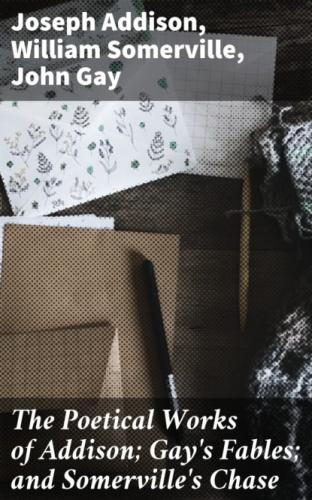And all things in confusion hurled,
Music shall then exert its power,
And sound survive the ruins of the world:
Then saints and angels shall agree
In one eternal jubilee:
All heaven shall echo with their hymns divine,
And God himself with pleasure see
The whole creation in a chorus join.
CHORUS.
Consecrate the place and day,
To music and Cecilia.
Let no rough winds approach, nor dare
Invade the hallowed bounds,
Nor rudely shake the tuneful air,
Nor spoil the fleeting sounds.
Nor mournful sigh nor groan be heard,
But gladness dwell on every tongue;
Whilst all, with voice and strings prepared,
Keep up the loud harmonious song,
And imitate the blest above,
In joy, and harmony, and love.
AN ODE FOR ST CECILIA'S DAY.
SET TO MUSIC BY MR DANIEL PURCELL. PERFORMED AT OXFORD 1699.
Prepare the hallowed strain, my Muse,
Thy softest sounds and sweetest numbers choose;
The bright Cecilia's praise rehearse,
In warbling words, and gliding verse,
That smoothly run into a song,
And gently die away, and melt upon the tongue.
First let the sprightly violin
The joyful melody begin,
And none of all her strings be mute;
While the sharp sound and shriller lay
_10
In sweet harmonious notes decay,
Softened and mellowed by the flute.
'The flute that sweetly can complain,
Dissolve the frozen nymph's disdain;
Panting sympathy impart,
Till she partake her lover's smart.'[4]
CHORUS.
Next, let the solemn organ join
Religious airs, and strains divine,
Such as may lift us to the skies,
And set all Heaven before our eyes:
_20
'Such as may lift us to the skies;
So far at least till they
Descend with kind surprise,
And meet our pious harmony half-way.'
Let then the trumpet's piercing sound
Our ravished ears with pleasure wound.
The soul o'erpowering with delight,
As, with a quick uncommon ray,
A streak of lightning clears the day,
And flashes on the sight.
_30
Let Echo too perform her part,
Prolonging every note with art,
And in a low expiring strain
Play all the concert o'er again.
Such were the tuneful notes that hung
On bright Cecilia's charming tongue:
Notes that sacred heats inspired,
And with religious ardour fired:
The love-sick youth, that long suppress'd
His smothered passion in his breast,
_40
No sooner heard the warbling dame,
But, by the secret influence turn'd,
He felt a new diviner flame,
And with devotion burn'd.
With ravished soul, and looks amazed,
Upon her beauteous face he gazed;
Nor made his amorous complaint:
In vain her eyes his heart had charm'd,
Her heavenly voice her eyes disarm'd,
And changed the lover to a saint.
_50
GRAND CHORUS.
And now the choir complete rejoices,
With trembling strings and melting voices.
The tuneful ferment rises high,
And works with mingled melody:
Quick divisions run their rounds,
A thousand trills and quivering sounds
In airy circles o'er us fly,
Till, wafted by a gentle breeze,
They faint and languish by degrees,
And at a distance die.
_60
AN ACCOUNT OF THE GREATEST ENGLISH POETS
TO MR HENRY SACHEVERELL. APRIL 3, 1694.
Since, dearest Harry, you will needs request
A short account of all the Muse-possess'd,
That, down from Chaucer's days to Dryden's times,
Have spent their noble rage in British rhymes;
Without more preface, writ in formal length,
To speak the undertaker's want of strength,
I'll try to make their several beauties known,
And show their verses' worth, though not my own.
Long had our dull forefathers slept supine,
Nor felt the raptures of the tuneful Nine;
_10
Till Chaucer first, the merry bard, arose,
And many a story told in rhyme and prose.
But age has rusted what the poet writ,
Worn out his language, and obscured his wit;
In vain he jests in his unpolished strain,
And tries to make his readers laugh in vain.
Old Spenser next, warmed with poetic rage,
In ancient tales amused a barbarous age;
An age that yet uncultivate and rude,
Where'er the poet's fancy led, pursued
_20
Through pathless fields, and unfrequented floods,
To dens of dragons and enchanted woods.
But now the mystic tale, that pleased of yore,
Can charm an understanding age no more;
The long-spun allegories fulsome grow,
While the dull moral lies too plain below.
